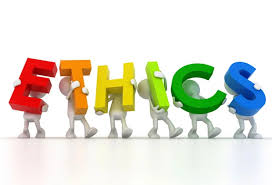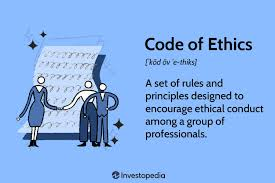Ethics
What is Ethics?
 Ethics is a set of moral principles that guide our behavior, helping us distinguish between right and wrong and make choices that are considered honest, fair, and responsible. It's about acting in accordance with what is good, not just what is legal, and striving for integrity in our interactions with others and the world around us, even when faced with difficult or ambiguous situations. In essence, ethics is our internal compass for living a moral and principled life.
Ethics is a set of moral principles that guide our behavior, helping us distinguish between right and wrong and make choices that are considered honest, fair, and responsible. It's about acting in accordance with what is good, not just what is legal, and striving for integrity in our interactions with others and the world around us, even when faced with difficult or ambiguous situations. In essence, ethics is our internal compass for living a moral and principled life.
Ethics in Finance
Ethics in finance encompasses the moral principles and standards of conduct that guide decision-making and actions within the financial industry. It demands honesty, integrity, and fairness in all transactions, requiring financial professionals to prioritize the best interests of their clients and stakeholders above personal gain. This involves avoiding conflicts of interest, maintaining confidentiality, practicing due diligence, and ensuring transparency in financial dealings. Ethical finance also includes adherence to professional codes of conduct and a commitment to responsible behavior that promotes the stability and integrity of the financial system, protecting against practices like insider trading, fraud, and predatory lending. In essence, it's about building trust and fostering a financial environment where all participants act with integrity and accountability.
Code of Ethics in Finance: Guiding Principles for Integrity
A code of ethics in finance is a set of guidelines outlining expected ethical behavior for financial professionals. It promotes trust, protects clients, and ensures integrity within the industry. These codes, from professional organizations, regulators, or firms, emphasize:
- Honesty and Integrity: Being truthful and avoiding deception.
- Objectivity and Independence: Making unbiased decisions.
- Fairness: Treating all clients equitably.
- Confidentiality: Protecting client information.
- Professional Competence: Maintaining and improving skills.
- Responsibility: Being accountable for actions.
- Compliance: Adhering to laws and regulations.
Violations can lead to fines, suspensions, or loss of licenses. These codes are crucial for building a trustworthy and responsible financial system by setting standards of conduct and protecting all stakeholders.
Ethical Issues in Finance: When Things Go Wrong with Money
Ethical issues in finance are situations where the rules of fair and honest behavior in the financial world are broken. It's like cheating, lying, or taking advantage of others with money.
Here are some common examples:
- Insider Trading: Using confidential information for personal gain in the stock market, which is illegal and unfair.
- Conflicts of Interest: Prioritizing personal gain over client interests, such as a financial advisor recommending investments for their own benefit, rather than what's best for the client.
- Misleading Clients: Lying or hiding important information from clients, like exaggerating returns on an investment.
- Churning: A broker making excessive trades to generate commissions, even if it doesn't benefit the client.
- Predatory Lending: Offering loans with unfair terms to vulnerable people.
Financial Statement Fraud: Faking the Numbers
Financial statement fraud is when a company intentionally manipulates its financial reports to look better than it is. It’s like a student changing their grades to look better.
Here are common ways it's done:
- Overstating Revenue: Reporting more sales than actually occurred.
- Understating Expenses: Hiding or minimizing costs to make profits look bigger.
- Manipulating Assets: Falsely increasing the value of assets or claiming to own things they don't.
- Hiding Debt: Not reporting all liabilities to make the company's financial health appear better.
- "Cookie Jar" Reserves: Hiding profits in good years and using them in bad years to artificially smooth out income, which can be misleading.
Why are these issues harmful?
- Loss of Trust: Undermines faith in financial institutions and markets.
- Financial Losses: Can cause people to lose savings, investments, and jobs.
- Economic Instability: Widespread issues can harm the economy.
- Unfair Competition: Allows unethical companies to gain an unfair advantage.
In Simple Terms:
- Ethical Issues: Breaking rules of fair play in finance, often resulting in harm.
- Financial Statement Fraud: Lying about a company's performance to deceive investors.
Both of these are serious problems that damage trust and are harmful to individuals and the economy. Awareness and prevention are key.
Duties of an Auditor: The Financial Checker
An auditor is like a financial checker, ensuring a company's financial information is accurate and reliable. They independently:
- Review Records: Examine financial documents for correctness.
- Check Accuracy: Verify that all transactions are properly recorded.
- Assess Controls: Evaluate the company's systems for preventing errors.
- Detect Fraud: Look for signs of financial wrongdoing.
- Provide an Opinion: Give a report on the fairness of the financial statements.
Auditors must be independent and objective. They help protect investors and maintain trust in the financial system. They are either external (independent) or internal (company employees).


No Comments